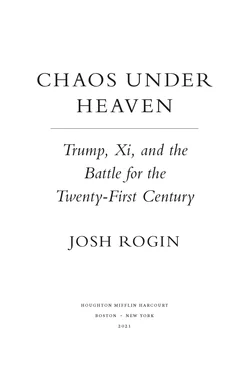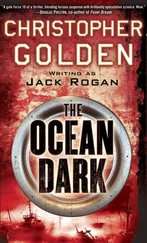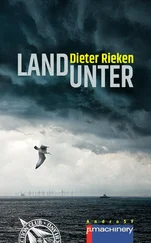Contents
Title Page
Contents
Copyright
Dedication
Epigraph
Prologue
The Transition
All Aboard
Mar-a-Lago and Beyond
The Road to War
The Trumps Go to Asia
The Bingo Club
Ploughshares into Swords
The Battle for the Future
New World Order
Cold War Redux
The Big Chill
Waking Up
Endgame
The Coronavirus
Epilogue
Acknowledgments
Notes
Index
About the Author
Connect with HMH
Copyright © 2021 by Josh Rogin
All rights reserved
For information about permission to reproduce selections from this book, write to trade.permissions@hmhco.com or to Permissions, Houghton Mifflin Harcourt Publishing Company, 3 Park Avenue, 19th Floor, New York, New York 10016.
hmhbooks.com
ISBN 978-0-358-39324-5
Cover design by Brian Moore
Author photograph © Stephen Gosling
eISBN 978-0-358-39383-2
v3.0321
To my parents, Michael and Sharon Rogin, for everything
There is great chaos under heaven . . . The situation is excellent.
—ATTRIBUTED TO MAO ZEDONG
Prologue
On Friday, December 9, 2016, a senior Chinese diplomat named Yang Jiechi took a seat at a table in the conference room on the fourteenth floor of 666 Fifth Avenue, a large skyscraper several blocks south of New York City’s Central Park. Just over one month had passed since the election that had secured Donald Trump the American presidency, vaulting the real estate magnate and reality TV star into the role of leader of the free world. The president-elect’s son-in-law, Jared Kushner, was also Trump’s close adviser and clearly a power broker in the incoming administration; in fact, the flagship property of his family’s real estate empire was 666 Fifth, the building in which Yang now sat. On the far wall, a large painting of Kushner’s grandparents loomed over the men and women assembled beneath it, including the small band of Chinese dignitaries who had just arrived.
Yang, a former Chinese ambassador to Washington and a member of China’s highest poiitical body, the Politburo, was flanked by current Chinese ambassador Cui Tiankai and two other embassy officials. Yang himself had cut his teeth as the personal English translator for former Chinese president Deng Xiaoping in the 1980s. He knew English almost as well as he knew the history of the struggle between China and the West—and as soon as the meeting got started, he made clear that he would not be mincing words.
“The territorial integrity and sovereignty of the People’s Republic of China is not to be questioned.”
Staring back at Yang, on the other side of the table, was a motley crew of Trump campaign loyalists, family members, and staffers—among them Kushner, Steve Bannon, Michael Flynn, Peter Navarro, and K. T. McFarland, the meeting’s official notetaker. Each would soon be a senior White House official. But none of them had believed, just one month prior, that they would be preparing a president-elect with zero real foreign policy experience to be the leader of the free world. And none of them were prepared to respond to these, the first words spoken by the leadership of China to the Trump transition team.
Yang had clearly come to New York on a mission. With a large binder sitting unopened in front of him, he held forth for an hour as he took the Trump team through a litany of Chinese government edicts, grievances, and demands. He educated the Americans on the long history of China and bemoaned China’s two hundred years of modern humiliation at the hands of European and Western powers. He defended expansive Chinese territorial claims, including Beijing’s assertion that 90 percent of the South China Sea belonged to China, based on what’s called the “nine-dash line,” the border line China wrote on its own map. He explained that China’s behavior was motivated by the unhelpful actions of its aggressive neighbors (which was taken to mean Japan). And he called on the United States to join China in “win-win cooperation,” a phrase Beijing’s leaders use to dissuade any confrontation of its behavior.
Yang also laid out a list of demands. Beijing wanted the new administration to adopt its strategic framework for the twenty-first-century US-China relationship—what Yang called a “new model of great power relations.” This was the same language often used by Chinese president Xi Jinping to say the United States should see—and treat—China as its equal. Yang also wanted Trump’s public support for China’s Belt and Road Initiative, a multitrillion-dollar worldwide infrastructure effort rife with political and diplomatic benefits for China. And the dignitary repeated well-worn Chinese government admonitions against US interference in whatever Beijing considered “core” issues. In essence, Yang was reminding the incoming administration that they should shut up about Taiwan, Tibet, Hong Kong, and internal Chinese affairs—including issues of religious freedom and human rights within China’s borders.
After an hour, Yang concluded his harangue. Both sides took a bathroom break. When they sat back down at the table, Yang pulled his materials toward him for the first time, lifted the first page, and began again:
“The territorial integrity and sovereignty of the People’s Republic of China is not to be questioned.”
He proceeded to repeat the entire diatribe for another hour. This was no longer a meeting; it was an elder lecturing a group of children.
At one point in the meeting, Bannon, Trump’s final campaign chief and an avowed enemy of the Chinese Communist Party, turned to Kushner and said, “It’s like foreign devils are so fucking stupid, you’ve got to tell them and then you’ve got to read it, and then you’ve got to tell the boss I told them and then I read it line for line. It’s like we’re morons.” Bannon wanted Yang to know he wasn’t buying it. In response to Yang’s demands, he was defiant, telling Yang that Trump was a disrupter, that “everything is on the table,” and that the Trump administration would not make any commitments before doing a full examination of US policy regarding China.
For his part, Flynn—a retired lieutenant general and former Defense Intelligence Agency director who had been Trump’s chief campaign foreign policy adviser and would soon become Trump’s first national security adviser—said almost nothing, other than to praise China’s Belt and Road Initiative, which the other American officials considered odd and unhelpful. For months on the campaign trail, candidate Trump had railed against China’s economic and trade policies, blaming China for stealing American jobs and outsmarting the US government on trade. By praising the Chinese project, the other US officials in the meeting felt, Flynn had laid bare his lack of actual China expertise.
Not everyone on the American side of the table was so clueless—or so restrained, even in comparison to Bannon. Navarro, a University of California at Irvine economics professor and five-time failed Democratic political candidate, had spent the campaign crafting the attacks on China that Trump used in his speeches. Now, he had a chance to tell the Chinese leadership what he thought to their face. Yet no sooner had he started to confront Yang on Chinese trade policy in heated tones, making accusations like, “You guys have been stealing our intellectual property for thirty years,” than McFarland, who was poised to soon be deputy national security adviser under Flynn, placed her hand on Navarro’s arm—a not subtle instruction to simmer down. Yang smirked. Navarro lost face. It would be the first of many times Trump’s officials indicated to their Chinese counterparts that Navarro was not someone they needed to heed.
Читать дальше











